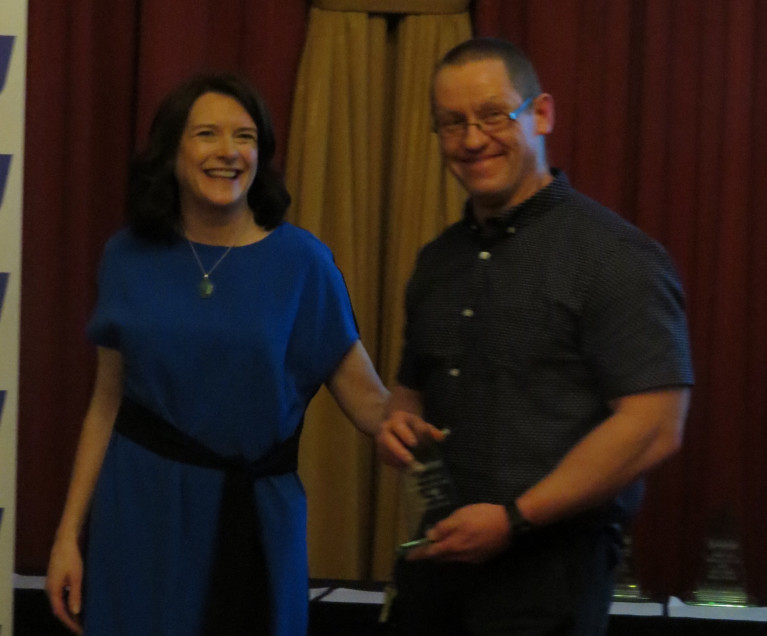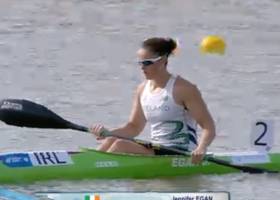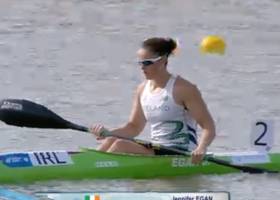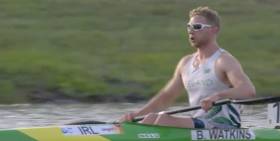Displaying items by tag: Jenny Egan
In Canoe Sprint, Ireland's Jenny Egan-Simmons got her season off to a neat perfect start winning bronze at the second World Cup race of 2022.
This podium finish takes Egan-Simmons into the double digits of international medals, with her 10th medal in the bag.
The second round of the 2022 Canoe Sprint World Cup was marred with extremely high winds, resulting in racing being postponed for the best part of most of the competition days, testing the adaptability and mental toughness of all competing.
Competing against these conditions and their rivals for Ireland were Paralympian Patrick O’Leary and Jenny Egan-Simmons. Patrick was lining up in the VL3 and KL3, with Jenny racing in her favoured 5000m. In what was his first outing onto the start-line after the Tokyo 2020 Paralympic Games Patrick displayed promising pace, qualifying through to the final of the KL3 200m, finishing in 9th overall. The VL3 proved more challenging, where Patrick finished 7th in his heat, missing the cut for the semi-final.
The final day of racing saw a significant improvement in both the conditions and the fortunes of the Irish Team. With a 4th place finish already under her belt from the previous week's World Cup race, Egan-Simmons had plenty of momentum going into the final of the women’s 5000m. This showed with a confident display of racing from Egan-Simmons, pushing right until the line in a close fight for the silver medal. The tight battle went just the other way with Melina Andersson (SWE) taking silver and Jenny taking the bronze. This medal also marked a milestone in Jenny’s career, her 10th international medal for Ireland.
Irish Canoeist Jenny Egan Takes World Silver Medal in the K1 Women 5000m
Irish canoeist Jenny Egan has had a dream finish to the 2021 ICF Senior World Championships, coming away with a Silver medal in the K1 Women 5000m.
A close-fought battle took place around the 23-minute course, with Jenny paddling a near-perfect race, just missing out to Emese Kohlami of Hungary in a sprint finish. The tightest of margins separate the medals, with the top 3 finishers being split by 1.96 seconds.
Earlier at the championships, Jenny had a disappointing finish in the 500m event, exiting the competition in the semi-final round. This did little but light a fire under the Irish paddler, who came back strong to win her second medal of the 2021 season. The first coming in the ICF World Cup Race in Barnaul, where Jenny took another silver medal in the same 5000m event.

Irish canoeist Jenny Egan has won a silver medal in the 5000m at last weekend’s Canoe Sprint World Cup in Barnaul, Russia. The performance is made all the more impressive coming off the back of a huge disappointment for Egan, missing out on the final Olympic qualification spot just three days previously.
Egan has made a strong statement with a silver medal win, the brilliant performance was backed up by a seventh place finish in the A final of the 200m two days previous.
These back to back fantastic performances came following a huge disappointment in the final Olympic Qualifier, where after making the final to fight for the final qualification spot for Tokyo Jenny finished 9th in the final missing out on the Olympic spot, the spot being ultimately taken by Russia.
Not one to sit back after an upset, Jenny immediately came back to make the 200m final of the World Cup. And even more impressively, took the fight to the 5000m final, coming home in 2nd place, just shy of the gold in a nail-biting sprint finish with the German Paulina Paszek. This will be added to Jenny’s previous Silver and Bronze medals won in her signature 5000m.
The Irish Canoe Sprint Team got back on the start-line for the opening race of the 2021 World Cup in Szeged, Hungary.
The event also played host to the return to competition for Paracanoe, and to the European Sprint Qualifier for the Tokyo Olympic Games.
Competing for Ireland were Jenny Egan (200m & 5000m), Ronan Foley (1000m & 5000m), and Patrick O’Leary (Paracanoe 200m VL3 & KL3).
The event opened with the Olympic Qualification racing, with the only Irish athlete contesting the spots on offer being Jenny Egan in the K1 Women 200m. Racing was very tight with the Olympics on the line, but Jenny displayed some very strong racing to progress through the rounds to make the final of the 200m where the top 2 nations would obtain an Olympic quota spot. After a great start putting her right in contention for the spot, Jenny slipped down the order to finish 8th in the final, with Olympic spots begin claimed by Great Britain and Italy.
In the World Cup which followed immediately on from the Olympic Qualification event Ireland saw some more finals appearances with some fantastic racing, and received a few upsets. Patrick O’Leary, Ireland’s Tokyo bound Paralympian, got his year off to a great start, qualifying through to the 200m final in both the KL3 and the VL3. With both being events Patrick will be contesting in Tokyo this summer, they were great markers to his form for the 2021 season. The VL3 saw his best performance, with a strong finish seeing Patrick come home in 6th. With the KL3 having a no less impressive performance to finish in 9th in the final.
In the longer 1000m and 5000m events Ireland had promising performances from Ronan Foley, mixing it with the best in the world at still a young age. Ronan finished the event in 22nd for the 1000m and 17th in the 5000m, and will look forward to taking this experience to the U23 competitions later this year. Jenny Egan who was also competing in the 5000m suffered a setback during the race, and ended up not completing the event.
Canoe Awards Gala Honours Stars and Long-Time Mentor
The Canoeing Ireland Awards Gala on Saturday night, which marked achievements in the sport in 2019, had plenty to celebrate. Liam Jegou, who will represent Ireland in canoe slalom at the Tokyo Olympics and Robert Hendrick, who qualified the boat, were both honoured.
Paralympian Patrick O’Leary, who also qualfied for Tokyo, was presented with his award by Miriam Malone, the chief executive of Paralympics Ireland. Malone and Karen Coventry of Special Olympics Ireland were keynote speakers at the event in the Spa Hotel.
The roll of honour on the night was long: Jenny Egan was chosen as best senior female paddler of the year in both canoe marathon and canoe sprint; Peter Egan was the chosen senior male in marathon canoeing. The senior Freestyle winners were Aoife Hanrahan and David McClure; Aisling Griffin and Michael Barry took the honours in the Paddle Surf category; Ciara Gurhy and Oisin McKay took the Canoe Polo honours. In the Wild Water category Odhran McNally (kayak) and Darragh Clarke (canoe) were honoured.
Oisin Feery, who starred for Ireland at the Special Olympics World Games in Abu Dhabi, won the Special Achievement award; the Event of the Year was Meelick Riverfest; the Team of the Year, the Ireland under-21 women’s Canoe Polo team. The Community Impact prize went to McMahon Cup.
The Volunteer of the Year award went to a man behind many of the medals won by Ireland in Canoe Marathon and Canoe Sprint, the indefatigable Tom Egan.
Jenny Egan Fourth at World Marathon Championships
#Canoeing: Jenny Egan took fourth at the canoe marathon World Championships in Shaoxing in China. The long race, over 26.2 km, saw the Irish K1 paddler miss out on the bronze, which was taken by Lizzie Broughton of Britain. Hungary’s Vanda Kiszli won gold. Egan had been sixth in the short K1 race.
Ronan Foley took 10th in the Under-23 ranks, and Peter Egan 23rd in the men’s senior K1. Peter Egan had won gold in the 40 to 40 age group at the World Masters Championships, also in Shaoxing.
Young Guns Foley and Thomsen Win at 60th Liffey Descent [UPDATE]
#Canoeing: Ronan Foley (19) and Nikolai Thomsen (18) of Denmark were the fastest home as the Liffey Descent celebrated its 60th birthday today. The 32-kilometre test, with 10 weirs and a portage on the journey from Straffan to the Garda Boat Club in Islandbridge, sometimes rewards experienced competitors, but this was an exception. Both young men were competing for the first time in a K2 (double kayak) on this course, but they took advantage of the fast conditons to win a battle with experienced hands Barry Watkins and Neil Fleming. Foley and Thomsen moved in the final 1,000 metres to win in one hour 46 minutes and 40 seconds. Watkins and Fleming came home in 1:46.49.
The entry of 472 boats was blessed with a beautiful day, and there were some excellent peformances. Jenny Egan continued her record of wins in the mixed K2; she and fiance Jon Simmons were fourth at Lucan weir and fifth overall in a new best time for this boat. Malcolm Banks in the men's over 49 K1, also placed high in the overall rankings, while Peter Egan won the men's K1 on his first attempt at the class.
Liffey Descent 2019, Detailed Results (selected)
K2 – Men’s: 1 Ronan Foley (Salmon Leap CC)/Nikolai Thomsen (Denmark) 1:46.40, 2 Neil Fleming (Celbridge Paddlers)/ Barry Watkins (Salmon Leap CC) 1:46.49, 3 Sebastien Fergauven/Sebastien Jocano (Argentina) 1:47.16. Men’s O39: 1 Simon van Lonkhuyzen/Gary Mawer (Salmon Leap CC) 1:55.59, 2 David Francis/Declan Halton (Salmon Leap CC) 1:59.28, 3 Lutz Erichsen/Peter M. Jensen (Denmark) 2:04.09.
Mixed: 1 Jonathan Simmons/Jenny Egan (Salmon Leap CC) 1:51.52, 2 Deaglan O Drisceoil/Aisling Smith (Salmon Leap CC) 1:57.58, 3 Nicky Cresser/Alison Chmiel (Nottingham CC) 2:07.20.
K1 – Senior Men: 1 Peter Egan (Salmon Leap) 1:57.43, 2 Donnacha Brennan (Thomastown CC) 2:00.22, 3 Odhran McNally (Salmon Leap CC) 2:01.33. O39 men: 1 Dermot Hudson (Salmon Leap CC) 1:59.36, 2 Stewart O’Regan (Salmon Leap CC) 2:04.12, 3 John Parker (Worcester CC) 2:13.19. O49: 1 Malcolm Banks (Salmon Leap CC) 2:02.50, 2 James Butler (Nottingham CC) 2:06.38, 3 Neil Blackman ( Royal Leamington Spa) 2:08.39. Junior men: Senan Forristal (Thomastown Paddlers) 2:01.04, 2 Matthew McCartney (Celbridge Paddlers) 2:08.077, 3 Alex O’Brien (Celbridge Paddlers) 2:20.15.
Senior women: 1 Margaret Farrell 2:56.23, 2 Sara Griffin 3:10.46, 3 Amy Walsh 3:21.38.Junior women: 1 Aoibhin Ni Broin (Galway CC) 2:39.23.
T2 – Sean Martin/Eddie Martin (Piragua Madrid/Richmond CC) 2:14.39, 2 Fergus Cooper/Morgan Cooper (Canoeing Ireland) 2:16.07, 3 Lar O’Brien/Michael O’Farrell (Kilcullen CC) 2:19.00.
Wildwater – Open: 1 Darragh Clarke (Wild Waater KC) 2:15.4, 2 Maggie Dilai (Nottingham KC) 2:17.49, 3 Alex Sheppy (Devizes CC) 2:26.26
K1 Class B – Men: 1 Colin Wong (Canoeing Ireland) 2:29.46, 2 Mark Redmond (Wild Water KC) 2:30.45, 3 Padraig Dunne Athy Rowing and CC) 2:37.25. O39: 1 Gerry Murphy (Canoeing Ireland) 2:32.12, 2 Edward Broekaart (Canoeing Ireland) 2:34.33, 3 Gary McClure (Belfast CC) 2:36.05 Junior men: 1 Cameron Bannatyne (Soar Valley) 2:18.33, 2 Ethan Dowling (Ribbontail Paddlers) 2:47.03, 3 Michael O’Herlihy (Wild Water KC) 2:48.18
K1 Class C: Men: 1 Craig Stratford (Virginia KC) 2:54.10, 2 Brian James (Cabra KC) 2:56.59, 3 Wojciech Szydlo (Silverbridge KC) 2:59.48. O39: 1 Terry Smith (Athy Rowing and CC) 2:37.10, 2 Andrew Redmond (Wild Water KC) 2:39.30 3 Dermot Forristal (Thomastown Paddlers) 2:39.44. Junior men: 1 Daniel Stratford (Virginia KC) 2:38.40, 2 Barry Stratford (Virginia KC) 2:41.29, 3 Alex Russell (Canoeing Ireland) 2:44.35.
Women: 1 Ciara Gurhy (Wild Water KC) 2:47.45, 2 Helen Flanagan (Share Centre) 2:55.53, 3 Yvonne Crosse (Phoenix KC) 3:04.21. O39: 1 Fiona Kelly (Wildwater KC) 2:49.50, 2 Yvonne Kelly Castleknock Community Collge KC) 2:50.38, 3 Mary Fitzgerald (Athy Rowing and CC) 2:58.27. Junior women: 1 Emma Fay (Ribbontail Paddlers) 3:14.20, 2 Rachel Alexander (Virginian KC) 3:20.04.
C1 – 1 Stephen Dunne (Mullingar CC) 3:11.16, 2 Andy Jeffers (Phoenix CC) 3:26.30, 3 Paul Magee (Canoeing Ireland) 4:05.55
C2 - 1 Ben Boland/Roger McClure (Kilkenny Aqua CC) 2:37.26, 2 Gearoid Jones/James Dillon (DIT CC) 2:47.54 3 Gerry Coonan/Gerry O’Brien (Wild Water KC) 3:00.42. C2 (mixed) – 1 Elaine Alexander/Richard Hobson (CANI/Lisburn City Paddlers) 2:57.58, 2 Colin Lively/Jacqui McVicar (Share Centre) 3:06.04, 3 Eamonn Dodd/Lynda Byron (Wild Water KC) 3:15.50.
C3 – 1 D Comerford/S O’Neill/S O’Neill (Thomastown Paddlers) 2:48.24, 2 Y Kalogerakis/ D Holden/B Comerford (Canoeing Ireland) 2:51.20, 3 K Durkan/S Durkan/M Fitzsimon (Celbridge Paddlers) 3:00.20.
Best Club (combined K1 and K2 times) : Salmon Leap Canoe Club, Leixlip
International Trophy: Ireland.
Liffey Descent Set for Busy Sixtieth Birthday
#Rowing: Jenny Egan and Jon Simmons of Salmon Leap Canoe Club defend their mixed K2 title at Saturday’s 60th anniversary Liffey Descent, which starts from Straffan at 12 o'clock and finishes 32 kilometres later at the Garda Boat Club in Islandbridge.
Egan is going for a third consecutive victory in this category - in 2017, she paired up with brother Peter to win in a course record time of 1 hour 55 minutes. Also competing in this category are Deaglan O Drisceoil and Aisling Smith of Salmon Leap, who finished second in the world renowned Sella Marathon in Spain earlier this summer. Both are previous K1 winners.
It will be an eleventh “Liffey” for Egan, who is attempting to win selection for the Tokyo Olympics and spent the summer competing at races around Europe.
Peter Egan, who finished second in men’s K2 last year, goes in K1 this year. Tadhg de Barra and Donnacha Brennan, both from Thomastown Paddlers, look like the other main contenders.
Barry Watkins, another Salmon Leap paddler, won his first K1 title last year, but reverts to K2 this time, where his partner is previous K1 winner Neil Fleming of Celbridge Paddlers. This could prove to be the most competitive class of the day with a number of strong Irish boats as well as at least four entries from the UK, two from Argentina, and one each from Spain, the Czech Republic and Germany.
Among the local entries, former European junior marathon champion Ronan Foley teams up with Nikolai Thomsen of Denmark for his first attempt at senior K2, while Michael Brennan, winner of the open canoe singles last year, takes to the water this time with his Thomastown club mate Anthony Forristal.
After a long dry summer, last year’s Liffey Descent was the driest on record which meant times were slow and fewer recreational boats entered. This year, low water won’t be a problem, thanks to plenty of rainfall in the past few months which means the ESB can release a small flood. Spectators on the banks of the Liffey may have good entertainment on Saturday. Premium spots are at the bridge in Straffan just down from the start and at Lucan weir.
C Final Place for Jenny Egan at World Championships
#Canoeing: Jenny Egan took eighth in her semi-final of the K1 500 metres and moved into the C Final at the canoe sprint World Championships in Szeged in Hungary today. The top three qualified for the A Final and stayed in contention for qualifying places for the Olympic Games.
Barry Watkins finished ninth in the B Final of the men’s K1 1,000 metres, 18th overall, while Egan had taken sixth in the C Final of the K1 200m, 24th overall.
Canoe Sprint World Championships, Szeged, Hungary
Men
K1 1,000m – B Final: 9 B Watkins 3:47.24
Women
K1 200m C Final: 6 J Egan 6:43.49
K1 500m Semi-Final Three (First Three to A Final; 4-6 to B Final; 7-9 to C Final): 8 Egan 2:00.01.
Watkins Takes Place in Second B Final at World Championships
#Canoeing: Barry Watkins qualified for the B Final of the men’s K1 1,000 metres at the canoe sprint World Championships in Szeged in Hungary. He finished sixth in his semi-final. He had earlier finished sixth in the B Final of the K1 500 metres (15th overall).
Jenny Egan qualified for Saturday’s semi-final of the K1 500 metres, taking fourth in her heat. This class is effectively the one remaining chance of Ireland qualifying a boat for the Olympic Games from the World Championships.
Egan took eighth in the semi-final of the K1 200m, slotting into the C Final for places 19 to 27.
Canoe Sprint World Championships, Szeged, Hungary, Day Three (Irish interest)
Men
K1 1,000m – Semi-Final (First Three to A Final; 4-6 to B Final; 7-9 to C Final): 6 B Watkins 3:30.89
K1 500m – B Final (places 10 to 18): 6 B Watkins 1 min 40.25 sec
Women
K1 200m – Semi-Final Three (First Three to A Final; 4-6 to B Final; 7-9 to C Final): 8 J Egan 41.03.
K1 500m – Heat Three: 4 Egan 1:53.54

































































